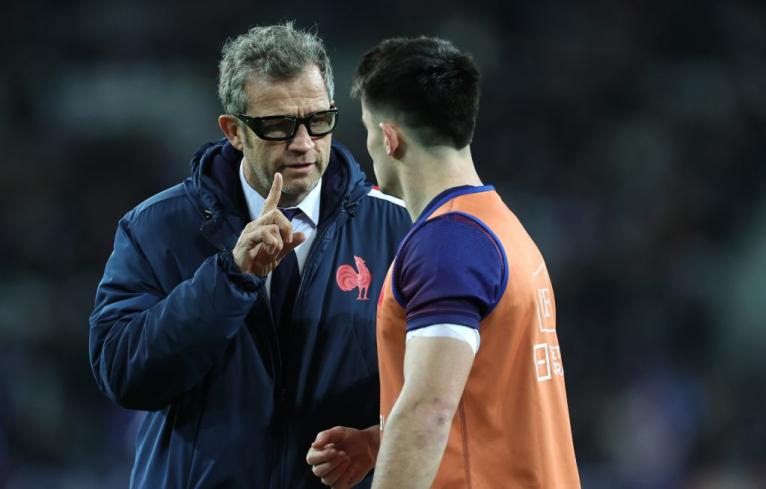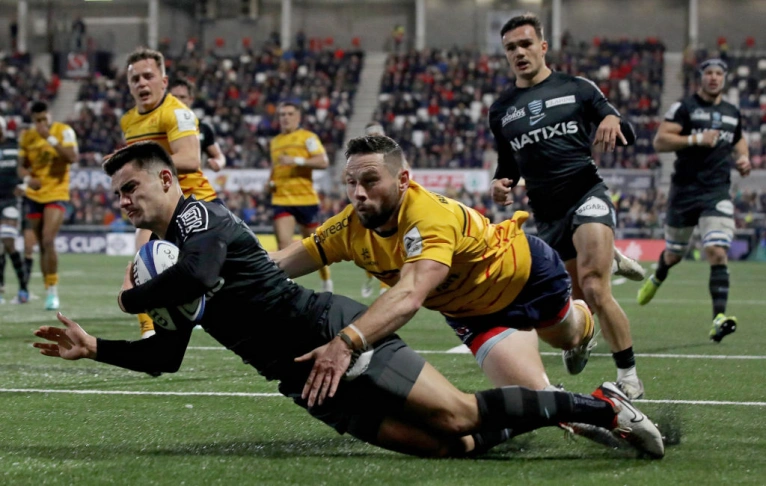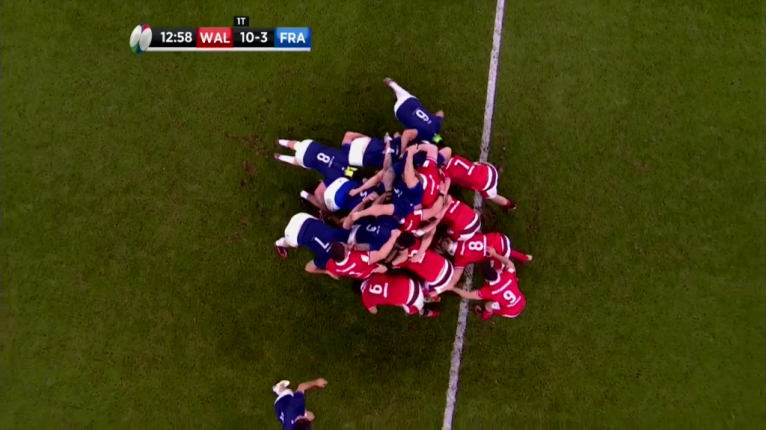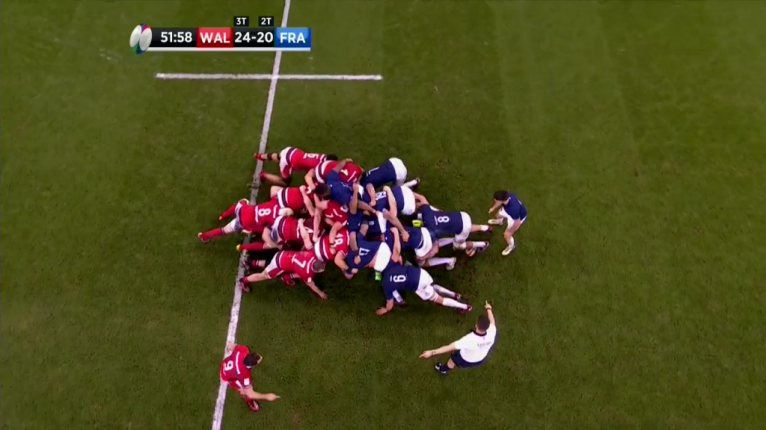It may have been a game between two nations with no chance of lifting the Six Nations trophy, but there was no lack of electric tension at the Principality Stadium on Sunday afternoon. After Wales’ 24-45 defeat, Welsh head coach Warren Gatland was in no mood to wait around for the clunky BBC post-match machinery to roll into action. He simply stalked off when nobody appeared to be ready to start an interview.
Gatland returned to speak to the national broadcaster after giving his thoughts to Welsh language channel S4C. Would he have stuck around in the first place if Wales had won, rather than succumbing to their fourth consecutive defeat? Quite possibly. But that is the effect of unforgiving external pressure, applied at the top end of the game.
France counterpart Fabien Galthié, who led his nation to the their most successful period for more than 15 years prior to the 2023 World Cup, had found himself under similar stress before the game. With Les Bleus struggling after Antoine Dupont’s hop over the fence to the international sevens circuit, all the old chestnuts about Galthié’s management style began to fall from the trees with an unapologetic thump.

The excellent television analyst and commentator, ex-Scotland back-row Johnnie Beattie, ruefully recalled his experiences with Galthié in the Top 14 at Montpellier Hérault back in 2020.
“He is the best technical coach I worked with,” Beattie told BBC Sport. “He was absolutely fantastic, ahead of the curve, but he struggled with player management.
“He struggled with being a decent human you want to buy into and work for. People bought into the fantastic rugby we played, not the culture or environment he would provide.
“I remember [assistant coach] Mario Ledesma screaming at a tight-head prop in a scrummaging session to try and work his way through the scrum – to get the cheeseburger at the other side of it, because he’s a fat pig. I laugh now, but when you are in the environment, it was complete humiliation.
“Some people crumbled and didn’t stay very long – a few capped internationals came and went within two or three months. A lot of people had their confidence destroyed, needed to get out, or were bullied.
“[Galthié] was a real Jekyll-and-Hyde of coaching, in that he was absolutely wonderful in technical stuff but also very capable of burning personal relationships and burning a club environment. I struggled to stomach how he was with other people.”

Beattie stayed in France for eight years, so he adapted better than most to the cut-throat training environment Galthié wanted to create. But with the national side struggling, everyone remembers Mister Hyde rather than Doctor Jekyll; the ruthless, bulldozing excoriation of the playing staff rather than the gilt-edged technical and tactical genius. The collective memory is selective and tuned to success. Win and you are Homeric in status; lose and all the skeletons tumble out of the closet.
Galthié, himself a dictatorial scrum-half in his playing days, was under pressure to prove France could play without their petit general at nine. On top of that, the lingering ghosts of the World Cup had to be exorcised, and that could only be achieved with a new injection of ésprit de corps. As I illustrated in a recent article, the key to reanimation was the selection of Racing 92’s Nolann Le Garrec ahead of UBB’s Maxime Lucu in the starting XV. France needed the young tyro’s energy and speed at the base of the breakdown to jump-start an ailing attack which had only generated five tries in the first three rounds.
That piece finished with the following words: “In such circumstances, there must be a wish both France in particular, and the rugby community in general, gets to see what Le Garrec has to offer – right from the start, freed from the shackles of the bench: ‘Float like a butterfly, sting like a bee. Oh, rumble young man, rumble’.”
On Sunday, both the beautiful butterfly and the angry bee were unleashed, and we got to see the coming young man of French rugby roam and rumble. Le Garrec’s free-spirited vivacity dominated the game, and it began the arduous task of repainting his predecessor in the blue jersey as tactical taskmaster, rather than totalitarian tyrant.
Make no mistake, Mister Hyde was still grumbling, if not rumbling in the engine-room of the French game. The monstrous starting right side of the Tricolores scrum, manned by 290KG of Uini Atonio and Emmanuel Meafou, only barely outweighed the two finishers – 142kg of replacement tight-head Georges-Henri Colombe supported by 135kg of grizzled Romain Taofifenua. Gatland understated the difficulty when he finally got to say his piece on BBC TV: “They put our scrum under pressure, which is something we’ve been working hard on, but we’re probably not there at the moment.”
Poor old Gareth Thomas on the Welsh loosehead side soon discovered the only way was out – as far away from Uini and Georges-Henri as he could manage.


The binding of the Welsh hooker and loose-head has so comprehensively split apart the men concerned might as well have been in the neighbouring counties, as they look to escape the extreme pressure down their left-hand side.
But Le Garrec was the real point of difference, and he provided the new spark for France on attack. Les Bleus’ active time in possession increased from an average of 17.7 minutes over the first three rounds to 20 minutes against Wales, they built 20 more rucks [from an average of 86 rucks per game to 106] while the ratio of lightning-quick ruck ball jumped by 10%, and the number of clean breaks from 4.3 to seven. With those kinds of numbers, it was no surprise Wales were out on their feet by the final quarter, losing the last 25 minutes 25-0.
The youthful Racing man is that rare breed – a true triple threat on the run, on the pass and with the boot. His exit kicks consistently cleared the halfway line without allowing a realistic possibility of return.
He had a grasp of the broader strategic picture, sufficient to double up on the kick even after a turnover of possession.
The first box kick is spotted well enough to encourage a French first touch on chase, the second immediately exploits the fact that Welsh full-back Cameron Winnett has been pulled up out of the backfield to make the receipt, leaving space in behind. Wales 10 Sam Costelow is buried deep in ‘coffin corner’ near the right sideline as he attempts to cover Winnett and make the clearance.
For a scrum-half looking to make short attacking chips in the red zone, it is imperative the kick is weighted not to cross over either the sideline or into the opponent’s in-goal area, relieving the pressure.
The touch on the kick forces Winnett to make first contact with the ball and carry over into the ‘end-zone’ under severe stress from France flyer Louis Bielle-Biarrey. That allowed France to settle into a 5m scrum on their own feed, and it inspired Le Garrec to showcase his speed and length on the pass, and nose for a gap on the very next play.
The Racing nine rifles a pass right across the face of the Welsh defensive line to his club-mate Gaël Fickou, dragging the Dragons wing Rio Dyer into the first tackle, and rendering it an impossible task for the remaining defenders to wrap and set up convincingly on the far side of the ruck.
That pass was mere preparation for the most spectacular highlight moment of the entire afternoon.
Another accurate box kick by the Parisian half-back has just been flapped back by a blue hand, and his next magic trick is a 30-metre reverse pass of which even the great Gareth Edwards would have been proud. It not only hits the target, it stimulates the French to tap into their ancestral heritage and run, run, run down the left-hand side of the field, seeking another unlikely ‘try from the end of the earth’.
It is Le Garrec’s speed to the breakdown or tackle, and his speed in choice of play when he arrives, which really marks him out as something special.
He is first feeding the scrum in midfield on his own 40m line, then accelerating into a 50m sprint to support Damian Penaud’s break down the right, finally making a magnificent one-hand pick-up on the run when he gets there. That is just the moment of ‘inspiration’, rather than the grinding reemphasis on ‘perspiration’ France needed. Iconic Lions coach Carwyn James would have heartily approved.
The final weekend of the Six Nations will feature a fitting climax with the encounter between France and England at the Parc Olympique Lyonnais late on 16th March. The vital signs of both nations will be rising after the attacking enterprise shown at Twickenham and in Cardiff in round four.
The soubriquet for match of the championship may already have been claimed by England vs Ireland, but that finale in the ancient capital of Lugdunum stands to run it a close second. The kick return games of both countries were thoroughly overhauled and reenergised after flatlining for most of the tournament.
The media profile of the competing coaches is at stake. If France lose, Galthié will once again be painted as tyrant rather than saviour, Mister Hyde rather than Doctor Jekyll, while England’s main man will sink back towards conservative ‘stagnant Steve’ Borthwick. They will not be fair portraits, as Gatland knows only too well, but it is a competition in which memories are short, and patience even shorter.



Comments
Join free and tell us what you really think!
Sign up for free